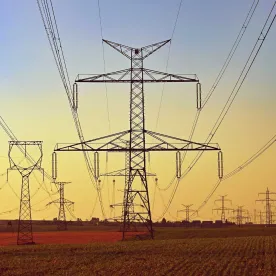On August 30, 2022, the Fifth Circuit issued an opinion condemning a far-reaching Texas law on electric transmission right-of-first-refusal (“ROFR”). The decision concerns a 2019 Texas law that restricted the ability to build, own, or operate new transmissions lines to only those entities already owning transmission facilities in the same region of the state (for example, MISO or SPP). Prior to Texas adopting the law, NextEra sought to construct the Hartburg Sabine transmission project, a transmission project planned in Texas (but outside of ERCOT) pursuant to MISO’s Order No. 1000 process. MISO awarded NextEra the rights to construct the project as part of that competitive process, and those rights were subsequently “derailed” by the new Texas ROFR law.
The court’s action rested on Dormant Commerce Clause grounds. Siding with NextEra and the U.S. Department of Justice’s Antitrust Division, the court found that the lower court erred in dismissing NextEra’s dormant commerce clause arguments—according to the court, such arguments could withstand a challenge of failure to state a claim.
In the thorough decision, the court reviewed FERC’s efforts in Order No. 1000 to balance federal and state jurisdiction, discusses intrastate versus interstate utility facilities, and addresses Texas ROFR law’s discriminatory effect on those not doing business within Texas. The court reasons that because the “electricity grid is on its own an interstate market, state protectionist measures regulating its instrumentalities run a much greater risk of harming out-of-state interests—the ability of companies to compete, the prices consumers pay—than regulations on” other entities like retail wine stores, dairies, or waste processing facilities.
Dormant Commerce Clause and Other State ROFR Laws
The lower court had dismissed the case for failure to state a claim and the Fifth Circuit decision reverses the lower court’s determinations, in part, and sends the case back for further litigation to determine whether Texas “has no other means to ‘advance[] a legitimate local purpose.’” The decision includes a discussion comparing the Texas ROFR to state transmission ROFRs in Nebraska, Oklahoma, North Dakota, Minnesota, and South Dakota. According to the Fifth Circuit, the Texas ROFR is far more restrictive than those found in other states.
In particular, the Fifth Circuit distinguishes between the Texas ROFR and the Minnesota ROFR law that was at issue in a previous Eighth Circuit decision in LSP Transmission Holdings, LLC v. Sieben, 954 F.3d 1018 (8th Cir. 2020). According to the Fifth Circuit, the Minnesota ROFR law upheld in LSP Transmission “does not go nearly as far as the Texas law in banning new entrants outright.” Specifically, the Fifth Circuit explains that the Texas ROFR provides no time limit on the incumbent transmission owner to exercise its rights. In contrast, the Minnesota ROFR law provides the incumbent provider 90 days to exercise its ROFR rights. In addition, the Texas ROFR law requires competing developers to own existing certificated facilities in the relevant market to the proposed transmission project, something that is not present in the Minnesota ROFR law.
The relevant statute, Tex. Util. Code § 37.-56(e), provides:
A certificate to build, own, or operate a new transmission facility that directly interconnects with an existing electric utility facility or municipally owned utility facility may be granted only to the owner of that existing facility. If a new transmission facility will directly interconnect with facilities owned by different electric utilities or municipally owned utilities, each entity shall be certificated to build, own, or operate the new facility in separate and discrete equal parts unless they agree otherwise.
Recent, Related FERC Action on ROFRs
The Fifth Circuit’s decision comes at a time when FERC has been considering making significant changes to its treatment of ROFRs. In its April 21, 2022 Notice of Proposed Rulemaking on transmission planning (“Transmission NOPR”) in Docket No. RM21-17-000,1 FERC appears to concede that its earlier elimination of the federal ROFR in Order No. 1000 may have been counterproductive and served to reduce investment occurring through the regional planning process. As a result, the Transmission NOPR proposes to allow incumbent transmission providers to retain a federal ROFR conditioned on a demonstration that the incumbent has established a qualifying joint ownership arrangement with an unaffiliated non-incumbent transmission developer or other unaffiliated entity. The deadline for initial comments in the Transmission NOPR proceeding was August 17, 2022. The ROFR proposal in particular attracted significant attention from commenters, including many supporting the proposal and many opposing the proposal. Among opponents included the U.S. Department of Justice and Federal Trade Commission (the “Agencies”). The Agencies submitted joint comments and expressed concern about the proposed reinstatement of a federal ROFR: “By its nature, a ROFR, conditional or otherwise, limits who can build transmission projects and is thus a regulatory barrier to entry. Although at this time competition may not be feasible in transmission planning due to the unique characteristics of the industry, recent experience in some RTOs underscores that competition in the design and construction of specific projects can work and benefits customers.” Agencies Comments at p. 11(Aug. 17, 2022). Reply comments in the proceeding are due on or before September 19, 2022.
FOOTNOTES
1. Building for the Future Through Electric Regional Transmission Planning and Cost Allocation and Generator Interconnection, Notice of Proposed Rulemaking, 179 FERC ¶ 61,028 (2022).





 />i
/>i

